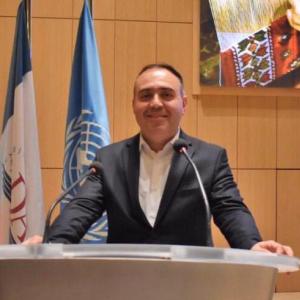Azerbaijan, international community mark World Day against Trafficking in Persons
30 July 2018
- The United Nations’ Migration Agency - International Organization for Migration (IOM), the Main Department on Combating Trafficking in Human Beings at the Ministry of Internal Affairs and the State Migration Service of Azerbaijan Republic organised a conference in Gusar to mark World Day against Trafficking in Persons.

The conference brought together government officials, members of the diplomatic corps, civil society organizations and other experts to strengthen cooperation to address this challenging cross-border issue.
In his opening remarks, United States Chargé d’Affaires William Gill shared the story of an Azerbaijani survivor of human trafficking and said, “When we talk about ending trafficking in persons, it is important to remember we are talking about human beings – each one deserving of respect for their fundamental, inalienable human dignity.”
IOM Chief of Mission Serhan Aktoprak spoke about the importance of ending trafficking in persons. “One of the key challenges standing before us today is supply chain engagement: companies can and must take responsibility for harm perpetrated against their workers and ensure that all possible steps are taken to assist victims of trafficking in their recovery – which they can do by working closely with governments, civil society organizations, international organizations, and the victims themselves,” he said.
Mr. Samir Zeynalov, Deputy Head of the Main Department on Combatting Trafficking in Human Beings of the Ministry of Internal Affairs, and Mr. Hidayat Rustamov, Head of Khachmaz Regional Migration Department of the State Migration Service, also gave remarks at the event.
With the financial support of the U.S. government, including USAID, IOM works with the Azerbaijani government to help prevent trafficking in persons, prosecute traffickers, and help survivors of trafficking and their families. With USAID funding, IOM has supported three civil society shelters in Azerbaijan to help vulnerable women and children, including survivors of domestic violence, exploitation and trafficking in persons. The shelters provide psychological, medical and legal support to help survivors of trafficking rebuild their lives and reintegrate into society. The three shelters supported by the project have provided direct assistance to over 118 trafficking survivors, and over 1,211 individuals vulnerable to trafficking in persons.


